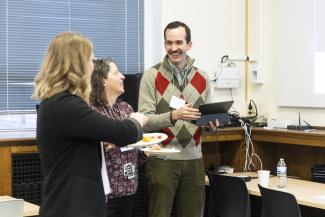The Center for the Enhancement of Learning and Teaching (CELT) is pleased to invite applications for its 2024-25 Teaching Innovation Institute. Now seeking its fifth cohort, the Teaching Innovation Institute is an agile program that collaboratively engages the most critical and emerging issues for higher education.
Following that mission, the 2024-25 Institute will focus on the evolving impact of generative artificial intelligence (AI) in teaching and learning.
Since the arrival of ChatGPT in late 2022, generative AI has developed at a rapid pace, offering both possibilities and provocations for higher education. Along with this development, a dizzying amount of commentary and research has attempted to make sense of a wide range of issues—fostering critical literacies, engaging ethical questions, ensuring and regulating safe development and implementation, considering social and historical contexts, developing practical skills, evaluating economic and workforce impact, augmenting and innovating in all areas of endeavor, enhancing educational goals and outcomes, and exploring the implications for our scholarly work and identities.
The Teaching Innovation Institute will invite instructors to reflect on and explore these issues (and others) with the goal of developing informed approaches to teaching with or in the context of generative AI.
To learn more about past cohorts, see the Teaching Innovation Institute's webpage.
Objectives
After completing the Teaching Innovation Institute, participants will be able to:
- Communicate effectively and persuasively regarding the nature of generative AI and its implications for their disciplines and professions
- Use generative AI technologies strategically in their disciplinary and professional contexts
- Evaluate the use of generative AI with respect to ethical, educational, and practical considerations
- Create effective learning environments and experiences that engage students with generative AI
Participants will ultimately implement instructional strategies, activities, and other pedagogical innovations in their classes and reflect on the process.
